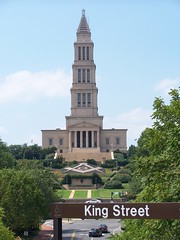There is plenty more wisdom from where that came from.
“George Washington famously warned against ... 'ungenerously throwing upon posterity the burden which we ourselves ought to bear” ― George Washington
“Paper money has had the effect in your state that it will ever have, to ruin commerce, oppress the honest, and open the door to every species of fraud and injustice.” ― George Washington
“We must consult our means rather than our wishes.” ― George Washington
“If freedom of speech is taken away, then dumb and silent we may be led, like sheep to the slaughter.” ― George Washington
“However [political parties] may now and then answer popular ends, they are likely in the course of time and things, to become potent engines, by which cunning, ambitious, and unprincipled men will be enabled to subvert the power of the people and to usurp for themselves the reins of government, destroying afterwards the very engines which have lifted them to unjust dominion.” ― George Washington
“...overgrown military establishments, which, under any form of government, are inauspicious to liberty, and which are to be regarded as particularly hostile to Republican Liberty.” ― George Washington, George Washington's Farewell Address
“A free people ought...to be armed” ― George Washington
 |
| Blake and Blythe at the Mount Vernon Colonial Market September, 2010 |
“I have a great many instructive Books,
on many subjects, as well as amusing ones.”
– GEORGE WASHINGTON to Lawrence Lewis, August 4, 1797In his address during the dedication of Washington's library last week, historian David McCullough said Mount Vernon is one of the most interesting and important historical sites in the world. But a creature of the government it is not so it will be open even when the government is closed.
Mount Vernon is owned and maintained in trust for the people of the United States by the Mount Vernon Ladies' Association of the Union, a private, non-profit organization [501(c)(3)] founded in 1853 by Ann Pamela Cunningham. The Association is the oldest national historic preservation organization in the country, and it has always been in the forefront of the restoration field. It is directed by a Board of Regents, comprised solely of women, who represent nearly 30 states. Also, a Board of Advisors of prominent citizens from across the country convenes twice a year to provide additional input on Mount Vernon's governance. The estate, gift shops and dining facilities are operated by over 500 paid employees and over 400 volunteers.
Mount Vernon is the most popular historic estate in America and is open 365 days a year. Over 80 million people have visited Mount Vernon since 1860, when the estate was officially opened to the public. Mount Vernon welcomes an average of one million guests each year.
The estate, gardens and farm of Mount Vernon totaled some 8,000 acres in the 18th century. Today, nearly 500 acres of this historic property have been preserved along the banks of the Potomac River. Guests can see Washington’s mansion and other original structures. The estate also includes the tomb of George and Martha Washington, a memorial dedicated to the slaves who lived and worked on the estate, the Ford Orientation Center, and the Donald W. Reynolds Museum and Education Center which includes 25 theaters and galleries. Mount Vernon does not accept grants from federal, state or local governments, and no tax dollars are expended to support its purposes. Primary sources of income are revenue from the retail and dining facilities, ticket sales, and donations from foundations, corporations, and individuals.
Colonial era music, Mount Vernon, VA
Yep, women owned and operated going back 160 years. The complex presents a fascinating look at our history and the man, his era and his home.
Fairfax Connector bus at Mt. Vernon entrance.
The tour is dedicated to the behind-the-scenes filming of the blockbuster movie National Treasure: Book of Secrets at Mount Vernon. The National Treasure Tour combines Hollywood and history, giving visitors stories about the filming and also information on how the locations were used during George Washington's time. Included in this approximately hour-long walking tour is the Mansion's basement and cornerstone, the setting for a pivotal scene. Fans of the movie will recognize the space as the location where Nicolas Cage's character kidnaps the president.To get to Mount Vernon, drive down the scenic GW Parkway, cruise down the Potomac, take the Gray Line Tour bus (sadly the Tourmobile is no more), use public transportation (Metro Rail to Huntington and Fairfax Connector bus from there) or ride a bike down the Mount Vernon Trail (the last hill is a doozy). However you go, it's an experience you will never forget.
While up in DC there's still plenty to see and do. Take a long walk up and down the mall and across Memorial Bridge into Arlington National cemetery. The street vendors are sure to be out offering vittles for lunch or a snack. In the city,
[t]he group Cultural Tourism DC says there will still be numerous arts and cultural options for visitors and residents. Steve Shulman, the group's executive director, says a shutdown may give visitors a chance to see different sites than those on the mall.
Museums and attractions planning to stay open include the Corcoran Gallery of Art, the Newseum, the International Spy Museum, National Geographic Museum, National Building Museum, The Phillips Collection, The Crime Museum and others.
There is an Art4All DC festival planned for this weekend. There are also more than 40 free tours of District of Columbia neighborhoods with the WalkingTown D.C. program through Cultural Tourism DC.
The Heurich House Museum is our offbeat favorite. Make a tour reservation now.
 |
| National Masonic Memorial across from King Street Metro station. |




No comments:
Post a Comment